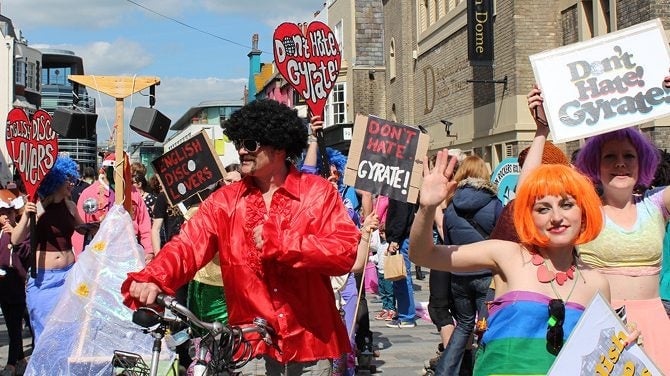Disco isn’t dead: It’s being used as a secret weapon for disarming British neo-Nazis
At one point in Woody Allen’s Manhattan (1979), the main character, Isaac, tells friends at a black-tie New York cocktail party about an upcoming Nazi rally in New Jersey:


At one point in Woody Allen’s Manhattan (1979), the main character, Isaac, tells friends at a black-tie New York cocktail party about an upcoming Nazi rally in New Jersey:
Isaac: We should go down there and get some guys together, you know, get some bricks and baseball bats and really explain things to ’em.
Man: There was this devastating satirical piece on that on the op-ed page of the Times. It is devastating.
Isaac: Well, a satirical piece in the Times is one thing, but bricks and baseball bats really gets right to the point there.
Woman: Oh, but really biting satire is always better than physical force. Think about it.
Isaac: No, no. Physical force is always better with Nazis—’cause it’s hard to satirize a guy with shiny boots.
The scene gets to the crux of a quandary many Americans have been facing in the days since the Charlottesville protests: how to oppose neo-Nazis without risking violence or making them seem a legitimate political concern?
A few years ago, when covering a rally by racist organization the English Defence League (EDL), I saw an answer. The demonstration itself was pitiful—a few dozen drunken skinheads meandering around in England soccer shirts, chanting Islamophobic slurs. Nonetheless, they must have been an intimidating sight for any Muslims or people of color.
As I pondered this, I heard the sounds of Gloria Gaynor’s “I will survive” come pounding round the corner. It was followed by hundreds of people dancing down the street, decked in wigs and flares. Gradually, they jived their way across the skinheads’ path. But there was no moment of tension, no fear of violence. The fascists looked annoyed, flummoxed, and deflated. The dancers, on the other hand, well, they just kept dancing. It was all worthy of a scene from one of Allen’s more surreal movies.
Who were these bewigged boogiers? They were also called the EDL, it turned out: the English Disco Lovers, a self-described “pro-disco, anti-racism group” with the motto “Don’t hate, gyrate!” They were founded by artist Chris Alton, whose aim was to subvert the EDL acronym, “making it more synonymous with ‘disco’ than ‘defence’, more synonymous with a message of love, rather than a message of hate,” he said in a 2015 TEDx talk.
Alton traces the history of disco as a defense against fascism and bigotry back to the original La Discothèque in Nazi-occupied Paris, through Harvey Milk in San Francisco and the start of the modern gay-rights movement, and the racist reactions against many of the musicians in the late 1970s. “We build upon that history, the history of disco as a site of musical resistance against fascism and we redeploy it in opposition to contemporary fascism,” he says.
That began with some pretty great memes and an attempt to overtake the English Defence League as the top Google search result for “EDL.”
Alton said in 2013 that they had achieved that goal, though a Google search in 2017 sees them on the second page of results. Nonetheless, their counter-protest tactic was devastatingly effective. Instead of engaging with the racists on their terms—fighting anger with more anger and making their threat seem real—the disco lovers ignored them, had a great time, and made the potentially scary fascists look ridiculous.
And so an afternoon that had begun with the worst elements of Englishness (loutishness, racism, and soccer hooliganism) was transformed into a scything display of irreverent, Python-esque humor. By overwhelming the English Defence League in numbers, the English Disco Lovers had found a middle ground between the neutering physical presence and biting satire that Woody Allen’s characters were arguing over.
I walked away with a spring in my step and The Pointer Sisters in my ears.